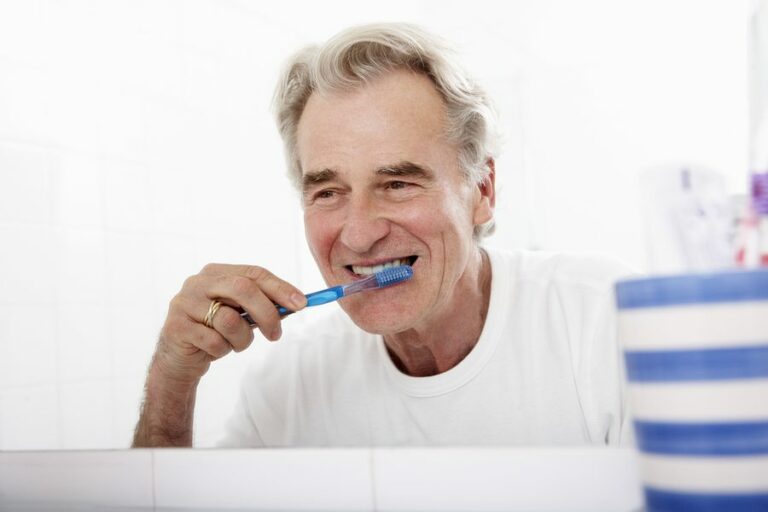
Oral hygiene is an important aspect of being a caregiver for a person with dementia. People with dementia often forget why brushing their teeth is important or even how to brush their teeth. When a person with dementia forgets to maintain their own oral health, it is up to family caregivers and elderly care providers to step in and assist. However, sometimes helping a dementia patient to take care of their teeth is easier said than done. If you’re struggling with helping a senior with dementia to take care of their oral health, here are some tips.
Start Taking Care of Teeth Early.
When a person is in the early stages of dementia, it’s important to focus on preventative measures to avoid more complex oral health issues down the road. Take care of any potential issues with teeth and gums while the person is only mildly impaired. It may be harder to tackle these issues in later stages of dementia. Also, when a person is in the later stages of dementia, they may be incapable of telling family caregivers and elderly care providers that there is something wrong. Taking care of teeth in the early stages could prevent such issues from occurring.
Keep Instructions Simple.
When the person needs instructions to carry out the task of brushing their teeth, break the task down in steps. Simply saying “brush your teeth” may be too difficult of an instruction to follow. Instead, break the task down into simple steps, like “hold the toothbrush” and “put toothpaste on the brush.” When that becomes too difficult, you may need to show a person how to brush their teeth by having them watch you and copy your movements. You might also try placing your hand over theirs and assisting them.
Be Aware of Mood.
If the person is agitated or argues with you about brushing their teeth, leave the task until later. Fighting with them will only upset you both and probably won’t result in effective brushing anyway. Move on to something else and come back to brushing later in the day.
Experiment with Toothbrushes.
If your loved one gets agitated when asked to brush their teeth or when caregivers and elderly care providers brush teeth for them, consider trying a different toothbrush. Sometimes a soft bristled children’s brush feels better to a person with dementia than a harder bristled adult brush. If caregivers are doing the brushing, an angled brush might be easier to use.
Watch for Signs of Pain.
Keep an eye out for signs that the person is experiencing mouth pain. Observe them when they eat, drink, and brush. Sometimes seniors with dementia will refuse to eat if their mouths hurt. Watch also for facial expressions that indicate pain. Pain may signal a problem with teeth or dentures that no longer fit well.
While helping a dementia patient to maintain good oral health can be difficult, it is important to their overall health and comfort. Having an elderly care provider visit the person’s home to assist with morning and evening routines, including brushing teeth, can take some of the strain off family caregivers who often find themselves spread too thin.
If you or an aging loved one are considering hiring elderly care in Greenville, SC, contact Heart of the Carolinas Home Care at 864-991-3116. Providing Home Care Services in Greenville, Simpsonville, Greer, Anderson, Spartanburg, Mauldin, Seneca, Laurens, Charleston, Columbia and the surrounding areas.
Sources
https://www.alzheimers.org.uk/info/20029/daily_living/9/dental_care
http://www.colgate.com/en/us/oc/oral-health/life-stages/oral-care-age-55-up/article/ada-11-dementia-and-oral-health-caregiving-tips
http://www.alz.org/care/alzheimers-dementia-dental.asp
- Is it Possible to Prevent Family Caregiver Burnout? - April 25, 2025
- Home Care Assistance Helps Seniors After A Fall - April 9, 2025
- How Home Care Supports Seniors Who Are Hard of Hearing - March 28, 2025

